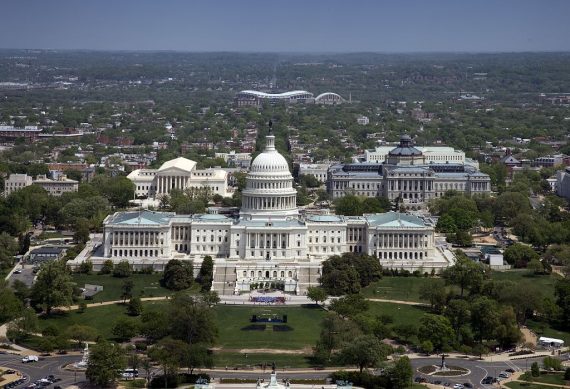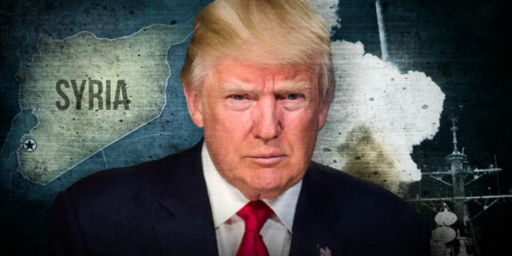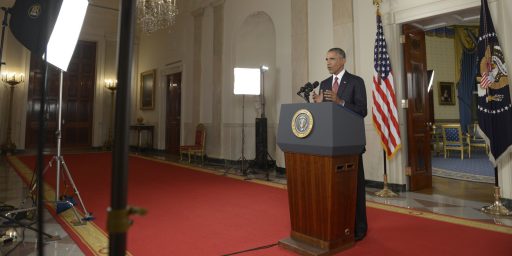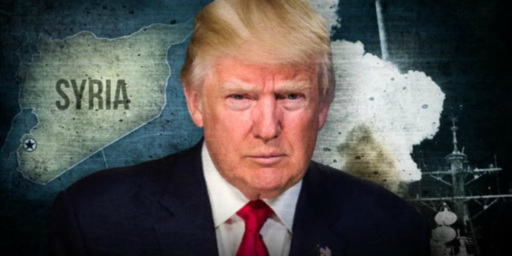Our Feckless Congress Is Shirking Its Constitutional Duties On The War Against ISIS
Yesterday, the British Parliament debated the expansion of that nation's military strikes against ISIS. For more than a year, our cowardly Congress has failed to even hold one debate or vote on America's role in that conflict.
Yesterday’s debate and vote in the British Parliament over the extension of the United Kingdom’s involvement in the war against ISIS stands as a stark reminder of the fact that, here at home, the United States Congress has failed to take any action to debate the President’s policy or to take any vote to authorize it. In part, of course, the differences in how the respective governments have proceeded is rooted in differences between how control over war making and foreign policy are handled. In the United Kingdom where David Cameron serves as the head of a government authorized to act by Parliament. Ultimately, the power to authorize military action in the British system lies with Parliament itself, although it apparently can and has delegated the authority to act in certain limited circumstances to the Prime Minister. In the United States, power is more divided. While Congress has the ultimate authority to declare war and the power to authorize or refuse to authorize specific military expenditures, the Constitution also gives the President significant discretion in this area that has historically given the President wide discretion to act, especially when Congress is compliant or simply unwilling to act. As Commander in Chief, the President has always had the recognized authority to order the use of military forces in emergency or defensive situations, or in cases where Congress could not be convened in a practical time to authorize action. The Constitution also gives the President, as Head of State, broad authority over foreign policy generally while Congressional authority in that area is generally limited to oversight, authorization of expenditures, and the confirmation of Ambassadors and ratification of Treaties by the Senate.
Over time, though, and especially since the end of World War II, Presidents have slowly expanded their authority in the war-making area notwithstanding the requirements of the Constitution, in many cases relying on threats related to the Cold War and treaty obligations through organization such as the United Nations to essentially bypass Congress. In the wake of the war in Vietnam, Congress responded by passing
the War Powers Act over President Nixon’s veto. While the intent of the law was to place limits on the ability of Presidents to commit American forces to foreign conflicts, though, the effect of the law has been to greatly enhance that power and gives the President the ability to commit U.S. military forces without seeking Congressional approval under a wide variety of circumstances. In summary, the Act “requires the president to notify Congress within 48 hours of committing armed forces to military action and forbids armed forces from remaining for more than 60 days, with a further 30 day withdrawal period, without an authorization of the use of military force or a declaration of war.” The advantages to the President with this type of arrangement are obvious. As long as Congress is notified, the President has the legal authority to engage in virtually any military action he desires. If that action is still ongoing 90 days later, then Congress is left with the option of cutting off funding to troops in the field after they’ve already been committed — and if a President refused to withdraw troops does anyone really believe that any Court anywhere would require him to do it? —- or simply acquiescing in the President’s action. While every President since Nixon has taken the position that the Act is unconstitutional, they have typically gone through the motions of complying with the acts provisions. In no case has Congress acted to try to restrain a President who has committed U.S. forces to a military operation, and efforts by some members of Congress to attempt to enforce the provisions of the War Powers Act in the courts have consistently been rejected as a “political question” in the form of a dispute between the two elected branches of government that it would be inappropriate for the courts to get involved in. It’s easy to see why Presidents would like the present state of affairs. After all, foreign policy, and especially the use of military force, is the one area where they have the most authority to begin with, and accumulating more power in that area allows them to act unilaterally and be, well, “Presidential,” if by Presidential you mean someone who orders the military to go in and blow things up without waiting around for Congress.
That’s not to say that Congress has been entirely inactive, of course. Prior to each of the three major wars that the United States has fought over the past twenty-five years, Congress has at the very least passed some kind of resolution authorizing the President to use military force. In the wake of Iraq’s invasion of Kuwait, for example, Congress authorized President George H.W. Bush to use military force to expel Iraqi forces from Kuwait. Of course, the fact that this resolution was passed after Bush had already sent some 500,000 troops to Saudi Arabia to face off across the desert against Iraq’s Army, and after United Nations Security Council resolutions authorizing the operation that arguably would have been legally sufficient justification for Bush to act raised some complaints that the vote was just a pro forma one. Nonetheless, the issue was debated and voted on, and the action was authorized. Similarly, in the wake of September 11th attacks, Congress overwhelmingly passed a broadly worded Authorization For The Use Of Military Force that gave President George W. Bush the authority to use military force to go after al Qaeda as well as any nation that was providing the terrorist group shelter, a resolution that remains in effect to this day and which has arguably been interpreted far too broadly. Finally, and most controversially, Congress debated and passed a resolution in 2002 authorizing the Iraq War that has had political consequences for many people who supported it over the years. While none of these resolutions were formally called a “declaration of war,” legal scholars generally agreed that the satisfied the Constitutional requirements for Congressional authorization, and it’s worth noting that the Constitution does not specify the form that such a declaration must take. At the very least, one can say that in each of these cases Congress had at least some debate about the merits of the proposed action of the Presidents involved, and Members Of the House and Senators were required to take a stand on the record regarding their own approval or disapproval of that plan.
Despite several discussions about the possibility of such a debate and vote, and the insistence by legislators such as Virginia Senator Tim Kaine and Kentucky Senator Rand Paul that a vote is an essential to provide the President legitimate legal authority for his current policy. Kaine, who has gone so far as to call the Administration’s current actions in Syria and Iraq without Congressional authorization in Iraq and Syria illegal has recently been joined by Arizona Republican Jeff Flake and Connecticut Democrat Chris Murphy in his efforts to push for a debate and vote on Congressional authorization. So far, though, leadership has shown no willingness to bring the matter up for a vote and newly installed Speaker Paul Ryan has given no indication that he intends to change position from the one that was being taken by his predecessor. The Administration, meanwhile, has done with Presidents have always done when faced with Congressional unwillingness to live up to its Constitutional responsibilities. Relying largely on a flimsy legal argument that links the attacks in Iraq and Syria to the Authorization For Use Of Force that was passed in the wake of the September 11th attacks for the purpose of taking on al Qaeda, the Obama White House has engaged in a war of escalation, retreat, and then further escalation that has no clear logic and, since Congress has not weighed in on the matter, its has essentially ceded the ground to the President notwithstanding the fact that, without Congressional authorization, the Presidents war against ISIS would seem to be clearly illegal.
At the very least, Congress owes the American people an open debate on the President’s ISIS strategy. As it stands, after more than a year of a largely incoherent policy that has consisted largely of a series of fits and starts that have created a pattern of gradual escalation from humanitarian mission, to air support for Iraqi and Kurdish operations, to bombing operations in Syria and, now, the presence of American special forces on the ground in Syria, it may already be too late for that debate since the President has set the nation down a path that it will be hard to deviate from no matter what Congress on the American people want to do. Despite that, though, the debate should take place. The fact that it has not constitutes nothing less than an irresponsible shirking of Constitutional duties by Congress that the American people should be outraged about.






It is just simple cowardice on the part of the GOP leadership in the House and the Senate. They do not want to authorize Obama’s actions because then it will be their fault too if things go badly. But even more than that, they don’t want to vote against any AUMF because their electorate is demanding action now.
They have put themselves between a rock and a hard place by reflexively opposing anything Obama does and demonizing his every action and word.
Wow, some kind of record, still able to comment after a good 6 or 7 hrs, Doug. Mark it on the calender. 😉
After the cluster eff of the Iraq war no politicians want their fingerprints on another war. Opposition of anything Obama is also a factor. They can read the polls and see that the American voter is opposed to any military adventurism.
They are, however, getting ready to vote for the 645th time on repealing Obamacare…which is simply veto-bait…and everyone knows it.
@OzarkHillbilly:
Of course they are cowards.
If they are afraid of the NRA…they must be wetting themselves over ISIS.
Republican sized diapers on aisle 3.
It’s less wimpiness and more polarization. Congress could act as an institution, but Republicans poisoned the well in 2010 by refusing to negotiate on anything after healthcare reform passed. (Regardless of whether it was poor negotiation by Obama during healthcare reform that started it, I feel confident in saying the Republican response was scorched earth tactics and completely unjustified.) Since then, there is no trust across the aisle, and that hampers Congress’s ability to act institutionally and assert its Constitutional prerogatives.
There’s also political noise, but politics change with the times. Institutional weakness like this only leads to decay.
Maybe Obama should ask formally for a declaration of war. Or at least for an update to the AUMF. You know, sort of like Bushitler.
The problem, obviously, is that Obama’s not really an actual president. He’s a Ken doll in a nice suit. Plus if Obama pushed too hard for a real warlike setting in Congress it would confuse the cabernet and brie and Prius/Coexist demographics that send tons of (inherited and allowance) money to Democrats and related PACs. For the left the only wars out there are the war on women and the war against mother nature, or whatever. The left is too loopy, too retarded, to handle Obama giving them a real dose of reality concerning ISIS. Obama is insouciant to that reality, too, at least in large respects.
As for Congress, it’s actually a good thing they’re not holding a British-style debate. What’s really to debate? Obama categorically will not send in ground troops. That doesn’t fit the narrative. Obama categorically will not wage a real air war, such as for example leveling Raqqa with non-stop carpet bombing. Again, that wouldn’t fit the narrative. Also too confusing for the cocktail parties in SoHo and Beverly Hills demographics. Plus can you fathom the likes of Debbie Wasserman-Shultz, Babs Boxer, Elizabeth Warren, etc., mugging for the cameras in connection with an ISIS war debate? Ugh. Thanks, but no thanks.
Our government is cowardly because the voters are idiots.
Voters have adopted the old, discredited “Zero Defects” approach. One vote against the NRA and you are anathema to the Right. One vote against abortion, and you are anathema to the Left. Say “Happy holidays,” instead of, “Merry Christmas,” and you’re an enemy to the Right. Tell an off-color joke and you’re evil to the Left.
We have become utterly polarized and absolutely intolerant and unforgiving. The fault is ours, and we should stop pretending that cowards and fools elect themselves. They are elected by cowards and fools. The problem is not them, it’s us.
@Bill Lefrak:
At the very least you are too stupid to use the word, “categorically”. Likely you are just completely full of shit.
Seriously…If you really have no idea what you are talking about…why bother? At least try to find out about the subject before impeaching your own credibility.
@Ron Beasley:
Well, they wouldn’t vote on the Iraq War either. One of the few times I agreed with Byrd was when he wondered why we weren’t debating the Iraq War on the eve of it. Even though I supported the war at the time, I wanted that debate. I wanted that vote. I fumed when the GOP would say, “We don’t need a vote, 9/11 blah blah blah”. Maybe if we’d had that debate, it wouldn’t have been such a catastrophe. In this case, it’s aggravated because no one really know how to deal with ISIS. But that’s why they should be having a debate.
This is simply shirking responsibility. It’s disgusting. And any politician — of either party — who goes along with it doesn’t belong in office.
We are at war, even if our leaders are in denial.
Years ago when I drove the Sleepytown Yellow Cab I would complain to the dispatcher about the condition of the Checker Marathon (complete with jump seats) that I was running.
No matter what my gripe was he always replied; “The only thing wrong with that car is the nut behind the wheel.”
The war in Libya
The war in Yemen
The war in Syria
The war in Iraq
That AUMF is a one size fits all authorization it seems.
didn’t the POTUS outline something back in Feb 15 and congress didn’t like it because it did not give enough what? it limited the time period and the Prez powers, what do they want? why don’t they draft something?
While not disagreeing with the general point here, I have to say that this is waaaaay down my list of things that this stupid cowardly incompetent pathetic Congress is failing to address.
The last time the US declared war was in 1942 against some Third Reich allies. Since then we have had four conflicts that cost more than 250 American KIA. Additionally, we have been in a ton of lesser conflicts. During the Cold War we heard the argument that WW III would take thirty minutes, and debating in Congress was impossible in that time frame. As others have pointed out, our leaders prefer to avoid responsibility and avoid taking any measurable stances.
A parliamentary system allows more than twp political parties and requires the leaders to face questioning. It might be good to make a switch.
You can lead a critter to Congress but you can’t make him debate.
@Tyrell:
Sure. Right after the attacks of September 11th our leaders said that we were at war. Then, the public and most of Congress stood behind the president as he elected to wage war in Iraq – not then thought to be an enemy, in fact a reliable ally in the region – whereupon we wasted trillions of dollars, lost 4,000 American lives, and destabilized the region to the point where ISIS now flourishes.
What do you think the oh-so-wise-and-wisdom-laden-public wants right now? Ground troops in Syria? More air strikes? More domestic surveillance of Muslims in America? Internment Camps for Muslim immigrants?
Not sure feckless is the right word for it. I believe they know they are not capable of conducting a rational debate on the topic. Feckless would be attempting to do it anyway, right?
“A man’s gotta know his limitations.”